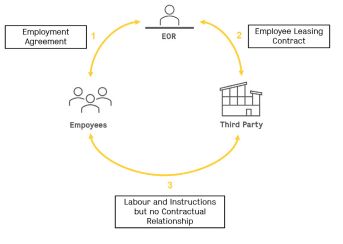- within Employment and HR topic(s)
- in United States
- within Employment and HR, Food, Drugs, Healthcare, Life Sciences and Privacy topic(s)
BACKGROUND
To operate efficiently on the global market, companies often engage workers in several jurisdictions. In order to simplify the process of engaging with these workers, companies may take advantage of so-called Employers of Record (EOR) and entrust those EOR to hire and employ workers on their behalf.
With the usage of EOR becoming more and more popular in Switzerland, many companies and global EOR providers do not yet seem to be fully aware of the specific legal requirements in Switzerland with regards to such a set-up.
This briefing aims to provide a short overview of the applicable legal requirements and potential pitfalls.
DEFINITION OF EOR
An EOR is a company that hires employees on behalf of a third party (Third Party) and then leases them back to that Third Party. EOR are usually used to manage the employment of employees who reside in a different jurisdiction to that of the Third Party.
In an EOR set-up, the EOR employs the worker, organises the affiliation with the applicable social security, pension and insurance institutions, and ensures proper payroll handling, while the worker provides their labour to the Third Party. While the formal employment relationship remains between the EOR and the employee, the employer's rights to direct and instruct the employee as well as to benefit from their labour is assigned to the Third Party.
LEGAL QUALIFICATION
The traditional EOR set-up described above, i.e., a Swiss formal employer leasing out an employee to a Third Party for the Third Party's business, qualifies as a lease of personnel (Personalverleih) and is regulated by the Swiss Federal Recruitment Act (RecA).

The lease of personnel system must be distinguished from standard outsourcing (Auslagerung), where employees carry out work on behalf of their actual employer for the benefit of a third party, but without being integrated within the organisational structures or being subject to the instructions of such a third party.
While the differentiation in individual cases might be difficult, a lease of personnel set-up may in particular be given if one or more of the following criteria have been met: (i) the employee is subject to the instructions and supervision of the Third Party; (ii) the employee is integrated within the Third Party's organisational structures/reporting lines; (iii) the Third Party provides the employee with tools and materials; and/or (iv) the Third Party bears the economic risk associated with an employee's activity
It is important to note that a lease of personnel from abroad to Switzerland is generally prohibited (except in very limited intra-group situations). A global EOR without a Swiss company/registered branch will therefore not be permitted to carry out personnel leasing activities for a Third Party in Switzerland.
REQUIRED CONTRACTS
A lease of personnel arrangement requires an employment agreement between the EOR and the employee as well as an employee leasing contract between the EOR and the Third Party.
The employment agreement must be concluded in writing with the following minimum content (art. 19 RecA):
- the kind of work to be performed;
- the place of work as well as the start date of the assignment;
- the duration of the assignment or the notice period;
- the working hours;
- the salary, any expenses and allowances and the deductions for social security contributions;
- the benefits in the event of overtime, illness, maternity, accident, military service and vacations; and
- the dates for payment of the salary, allowances and other benefits.
If an EOR holds a cantonal or federal licence and its main activity is the leasing of personnel, e.g., if more than 50% of the EOR's total revenue is generated by the leasing of personnel, the collective bargaining agreement regarding lease of personnel applies to the employment agreement (art. 2 para. 1 CBA Personnel Leasing).
The employee leasing contract must be concluded in writing with the following minimum content (art. 22 RecA):
- the address of the EOR and the competent authority granting the licence;
- the professional qualifications of the employee and the kind of work to be performed;
- the place of work as well as the start date of the assignment;
- the duration of the assignment or the notice periods;
- the working hours of the employee; and
- the cost of the employee leasing, including all social benefits, allowances, expenses and other benefits.
REQUIRED LICENCE(S)
If an EOR conducts a commercial lease of personnel business, a licence requirement exits. The lease of personnel business is deemed commercial if it exceeds an occasional and unplanned leasing of employees for short periods of time and in particular if: (i) employees are leased out on a regular basis (i.e., more than ten employees leased out within a period of twelve months) with the intent to generate revenue, and/or (ii) an annual revenue of CHF 100'000 or more is generated with the leasing activity (art. 29 of the Recruitment Ordinance, RecO). In cases involving a lease of personnel within Switzerland only, a cantonal licence is required. In situations where there is a lease of personnel to abroad, a SECO licence is also necessary.
The criteria for obtaining a licence include in particular (i) organisational requirements in respect of the EOR's business (Organisational Requirements) (art. 3 para. 1 RecA), (ii) requirements in respect of the person who manages the lease of employees' activity within the EOR's business (Personal Requirements) (art. 3 para. 2 RecA), and (iii) the payment of a deposit (at least CHF 50'000 for lease of personnel within Switzerland only, extending to at least CHF 100'000 for the lease of personnel to Third Parties abroad) (art. 35 RecO). Organisational requirements include completing the registration process with the Swiss commercial register, suitable business premises, and the presence of a manager who fulfils the Personal Requirements (art. 3 para. 1 RecA). Personal requirements relate to the experience and training of such manager, who must be either a Swiss citizen or a foreign national with a C-Permit (Niederlassungsbewilligung) with a suitable professional background as well as clean criminal and debt enforcement records (art. 3 para. 2 RecA).
Before considering the usage of an EOR, a Third Party should check the publicly available register to ensure that the EOR holds the required licence(s).
SANCTIONS
From a civil law perspective, both the employment agreement and the employee leasing contract will be null and void ab initio if an EOR engaged in the commercial lease of personnel does not hold the required licence(s) (art. 19 para. 6 and 22 para. 5 RecA). However, if an employee did perform work in good faith for an EOR under a contract which is subsequently found to be invalid, the EOR and the employee must discharge their obligations under the employment relationship as if the contract had been valid until such time as one party terminates the relationship on grounds of the invalidity of the contract (art. 22 para. 5 RecA in connection with art. 320 para. 3 CO). From a criminal law perspective, an EOR performing a commercial lease of personnel without holding the required licence(s) may be subject to a fine of up to CHF 100'000. Third Parties may be subject of a fine of up to CHF 40'000 if they knowingly accept the services of an employee of an EOR not holding the required licence(s) (art. 39 RecA).
POINTS TO CONSIDER
It is important to note that in an EOR arrangement, the employee's employment agreement is with the EOR and the employee's obligations (e.g., duty of loyalty, confidentiality, IP assignment as well as non-compete and non-solicitation undertakings) are generally only towards the EOR. It should be ensured that the Third Party also profits from these obligations, either by also wording them clearly as obligations towards the Third Party or by concluding a distinct and separate agreement between the employee and the Third Party. The Third Party should also be assigned the right to terminate the employment agreement. Finally, the Third Party should always carefully check that the set-up does not qualify as an unlawful lease of personnel from abroad to Switzerland and that the EOR holds the required permit(s).
Footnotes
1. See Konzerninterner Personalverleih – Beurteilung der Bewilligungspflicht / Weisung 2017; Präzisierung der Weisungen und Erläuterungen zum AVG, 20. Juni 2017, available on (last visited on 19 August 2022).
2. https://www.avg-seco.admin.ch/WebVerzeichnis/ServletWebVerzeichnis (last visited on 19 August 2022).
The content of this article is intended to provide a general guide to the subject matter. Specialist advice should be sought about your specific circumstances.



